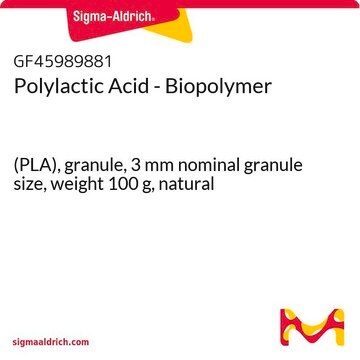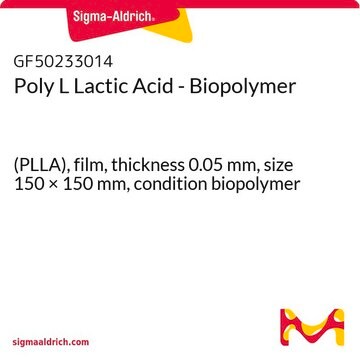Fontos dokumentumok
764590
Poly(L-lactide)
average Mn 5,000, PDI ≤1.2
Szinonimák:
PLLA, Polylactide, L-Lactide polymer, PLA, Poly(L-Lactic acid)
About This Item
Javasolt termékek
form
solid
Minőségi szint
optikai aktivitás
[α]22/D -147°, c = 0.5% in chloroform
molekulatömeg
average Mn 5,000
lebomlási időtartam
>3 years
átmeneti hőmérséklet
Tm 149-154 °C
PDI
≤1.2
tárolási hőmérséklet
2-8°C
Looking for similar products? Látogasson el ide Útmutató a termékösszehasonlításhoz
Általános leírás
Alkalmazás
Tulajdonságok és előnyök
Tárolási osztály kódja
11 - Combustible Solids
WGK
WGK 3
Lobbanási pont (F)
Not applicable
Lobbanási pont (C)
Not applicable
Válasszon a legfrissebb verziók közül:
Már rendelkezik ezzel a termékkel?
Az Ön által nemrégiben megvásárolt termékekre vonatkozó dokumentumokat a Dokumentumtárban találja.
Az ügyfelek ezeket is megtekintették
Cikkek
Professor Aran discusses engineering graphene-based materials through careful functionalization, enabling diverse applications.
Local delivery of bioactive molecules using an implantable device can decrease the amount of drug dose required as well as non-target site toxicities compared to oral or systemic drug administration.
Synthetic aliphatic polyesters dominate resorbable biomaterials in clinical use.
AliAliphatic polyesters, including polylactide and polyglycolide, are biodegradable polymers widely used in medical applications.
Tudóscsoportunk valamennyi kutatási területen rendelkezik tapasztalattal, beleértve az élettudományt, az anyagtudományt, a kémiai szintézist, a kromatográfiát, az analitikát és még sok más területet.
Lépjen kapcsolatba a szaktanácsadással







